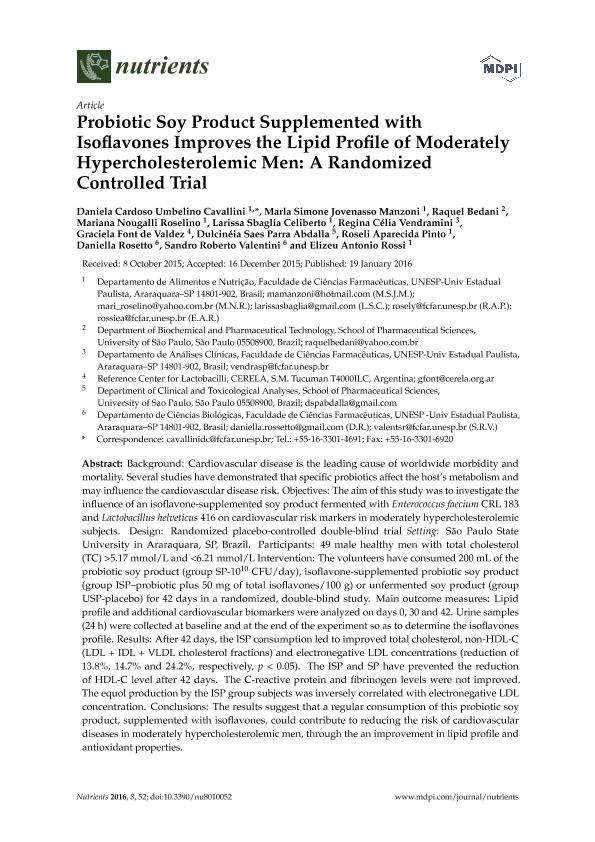Artículo
Probiotic soy product supplemented with isoflavones Improves the lipid profile of moderately hypercholesterolemic men: a randomized controlled trial
Cavallini, Daniela Cardoso Umbelino; Manzoni, Marla Simone Jovenasso; Bedani, Raquel; Roselino, Mariana Nougalli; Celiberto, Larissa Sbaglia; Vendramini, Regina Célia; Font, Graciela Maria ; Abdalla, Dulcinéia Saes Parra; Pinto, Roseli Aparecida; Rosetto, Daniella; Valentini, Sandro Roberto; Rossi, Elizeu Antonio
; Abdalla, Dulcinéia Saes Parra; Pinto, Roseli Aparecida; Rosetto, Daniella; Valentini, Sandro Roberto; Rossi, Elizeu Antonio
 ; Abdalla, Dulcinéia Saes Parra; Pinto, Roseli Aparecida; Rosetto, Daniella; Valentini, Sandro Roberto; Rossi, Elizeu Antonio
; Abdalla, Dulcinéia Saes Parra; Pinto, Roseli Aparecida; Rosetto, Daniella; Valentini, Sandro Roberto; Rossi, Elizeu Antonio
Fecha de publicación:
19/01/2016
Editorial:
MDPI
Revista:
Nutrients
ISSN:
2072-6643
e-ISSN:
2072-6643
Idioma:
Inglés
Tipo de recurso:
Artículo publicado
Clasificación temática:
Resumen
Cardiovascular disease is the leading cause of worldwide morbidity andmortality. Several studies have demonstrated that specific probiotics affect the host?s metabolism and may influence the cardiovascular disease risk. Objectives: The aim of this study was to investigate theinfluence of an isoflavone-supplemented soy product fermented with Enterococcus faecium CRL 183 and Lactobacillus helveticus 416 on cardiovascular risk markers in moderately hypercholesterolemic subjects. Design: Randomized placebo-controlled double-blind trial Setting: São Paulo State University in Araraquara, SP, Brazil. Participants: 49 male healthy men with total cholesterol (TC) >5.17 mmol/L and <6.21 mmol/L Intervention: The volunteers have consumed 200 mL of the probiotic soy product (group SP-1010 CFU/day), isoflavone-supplemented probiotic soy product (group ISP?probiotic plus 50 mg of total isoflavones/100 g) or unfermented soy product (group USP-placebo) for 42 days in a randomized, double-blind study. Main outcome measures: Lipidprofile and additional cardiovascular biomarkers were analyzed on days 0, 30 and 42. Urine samples (24 h) were collected at baseline and at the end of the experiment so as to determine the isoflavones profile. Results: After 42 days, the ISP consumption led to improved total cholesterol, non-HDL-C (LDL + IDL + VLDL cholesterol fractions) and electronegative LDL concentrations (reduction of 13.8%, 14.7% and 24.2%, respectively, p < 0.05). The ISP and SP have prevented the reduction of HDL-C level after 42 days. The C-reactive protein and fibrinogen levels were not improved.The equol production by the ISP group subjects was inversely correlated with electronegative LDL concentration. Conclusions: The results suggest that a regular consumption of this probiotic soy product, supplemented with isoflavones, could contribute to reducing the risk of cardiovasculardiseases in moderately hypercholesterolemic men, through the an improvement in lipid profile and antioxidant properties.
Archivos asociados
Licencia
Identificadores
Colecciones
Articulos(CERELA)
Articulos de CENTRO DE REFERENCIA PARA LACTOBACILOS (I)
Articulos de CENTRO DE REFERENCIA PARA LACTOBACILOS (I)
Citación
Cavallini, Daniela Cardoso Umbelino; Manzoni, Marla Simone Jovenasso; Bedani, Raquel; Roselino, Mariana Nougalli; Celiberto, Larissa Sbaglia; et al.; Probiotic soy product supplemented with isoflavones Improves the lipid profile of moderately hypercholesterolemic men: a randomized controlled trial; MDPI; Nutrients; 8; 1; 19-1-2016; 1-18;52-52
Compartir
Altmétricas



